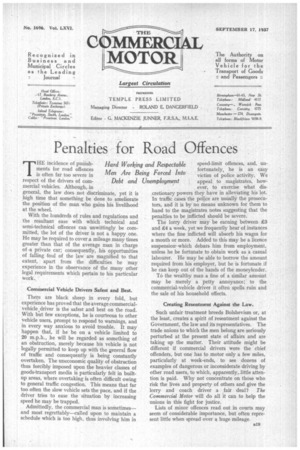Penalties for Road Offences
Page 29

If you've noticed an error in this article please click here to report it so we can fix it.
THE incidence of punishments for road offences is often far too severe in respect of the drivers of commercial vehicles. Although, in general, the law does not discriminate, yet it is high time that something be done to ameliorate the position of the man who gains his livelihood at the wheel.
With the hundreds of rules and regulations and the resultant ease with which technical and semi-technical offences can unwittingly be committed, the lot of the driver is not a happy one. He may be required to cover a mileage many times greater than that of the average man in charge of a private car; consequently, his opportunities of falling foul of the law are magnified to that extent, apart from the difficulties he may experience in the observance of the many other legal requirements which pertain to his particular work.
Commercial Vehicle Drivers Safest and Best.
There are black sheep in every fold, but experience has proved that the average commercialvehicle driver is the safest and best on the road. With but few exceptions, he is courteous to other vehicle users, prompt to respond to warnings, and in every way anxious to avoid trouble. It may happen that, if he be on a vehicle limited to 20 m.p.h., he will be regarded as something of an obstruction, merely because his vehicle is not legally permitted to keep up with the general flow of traffic and consequently is being constantly overtaken. The uneconomic quality of obstruction thus forcibly imposed upon the heavier classes of goods-transport media is particularly felt in builtup areas, where overtaking is often difficult owing to general traffic congestion. This means that far too often the slow vehicle sets the pace, and if the driver tries to ease the situation by increasing speed he may be trapped.
Admittedly, the commercial man is sometimes— and most regrettably—called upon to maintain a schedule which is too high, thus involving him in speed-limit offences, and, unfortunately, he is an easy victim of police. activity. We appeal to magistrates, however, to exercise what discretionary powers they have in alleviating his lot. In traffic cases the police are usually the prosecutors, and it is by no means unknown for them to hand to the magistrates notes suggesting that the penalties to be inflicted should be severe. The lorry driver may be earning between 3 and £41 a week, yet we frequently hear of instances where the fine inflicted will absorb his wages for a month or more. Added to this may be a licence suspension-which debars him from employment, unless he be fortunate to obtain work as .a casual labourer. He may be able to borrow the amount required from his employer, but he is fortunate if he can keep out of the hands of the moneylender.
To the wealthy man a fine of a similar amount may be merely a petty annoyance; to the commercial-vehicle driver it often spells ruin and the sale of his household effects.
Creating Resentment Against the Law.
Such unfair treatment breeds Bolshevism or, at the least, creates a spirit of resentment against the Government, the law and its representatives. The trade unions to which the men belong are seriously perturbed at the present state of affairs and are taking up the matter. Their attitude might be different if commercial drivers were the chief offenders, but one has to motor only a few miles, particularly at week-ends, to see dozens of examples of dangerous or inconsiderate driving by other road users, to which, apparently, little attention is paid. Why not concentrate on those who risk the lives and property of others and give the lorry and coach driver a fair deal? The Commercial Motor will do all it can to help the unions in this fight for justice.
Lists of minor offences read out in courts may seem of considerable importance, but often represent little when spread over a huge mileage.




















































































